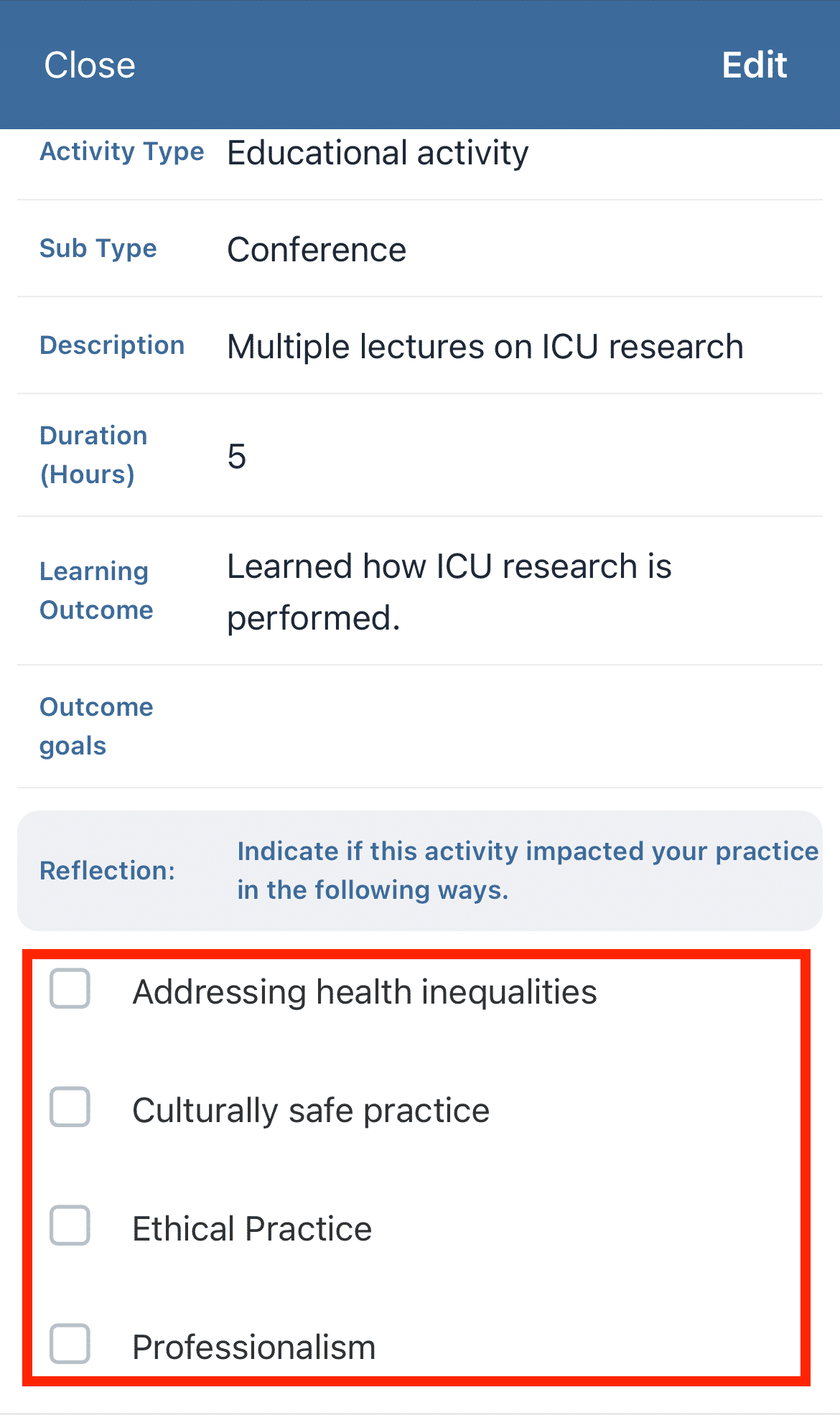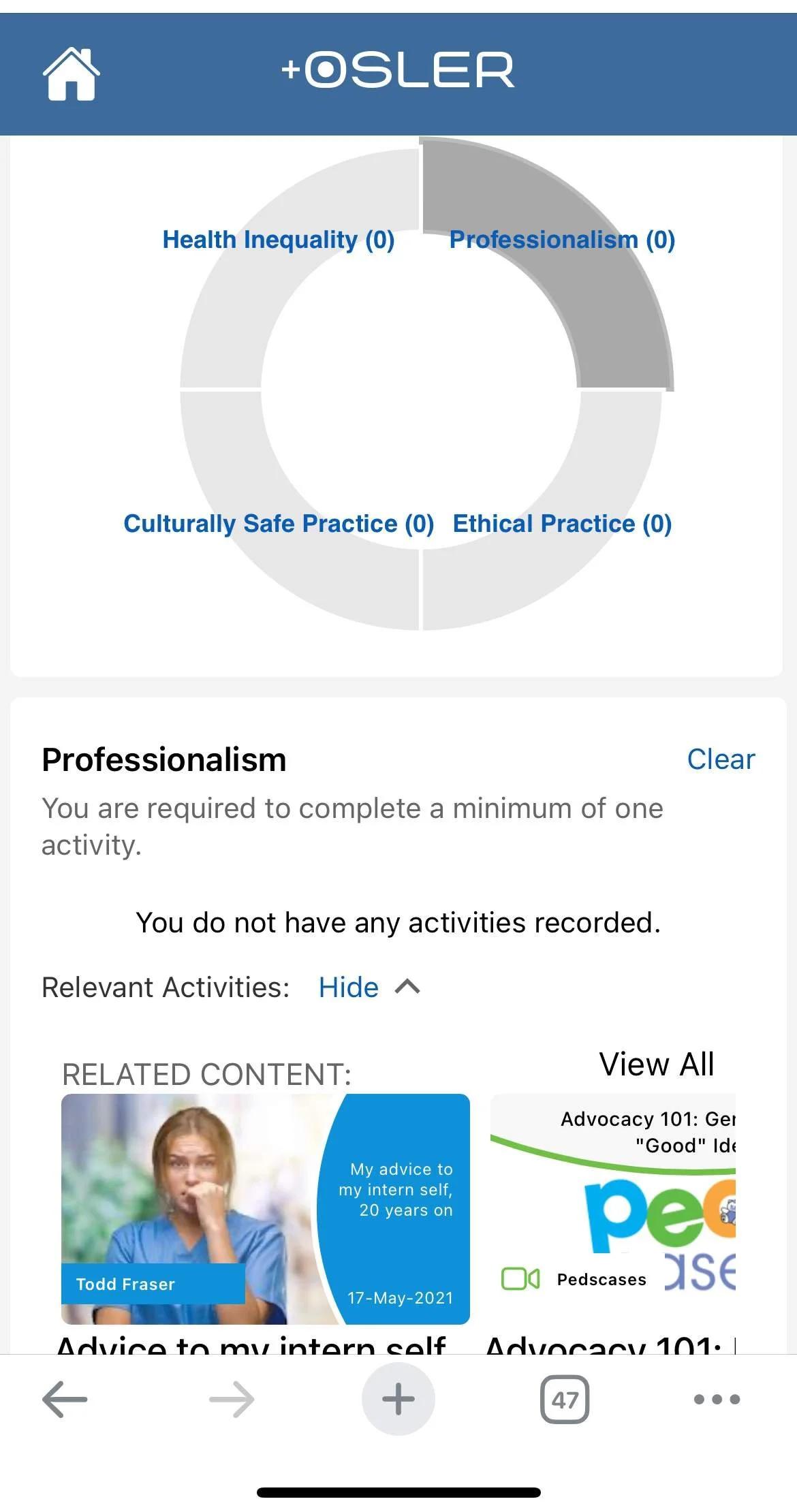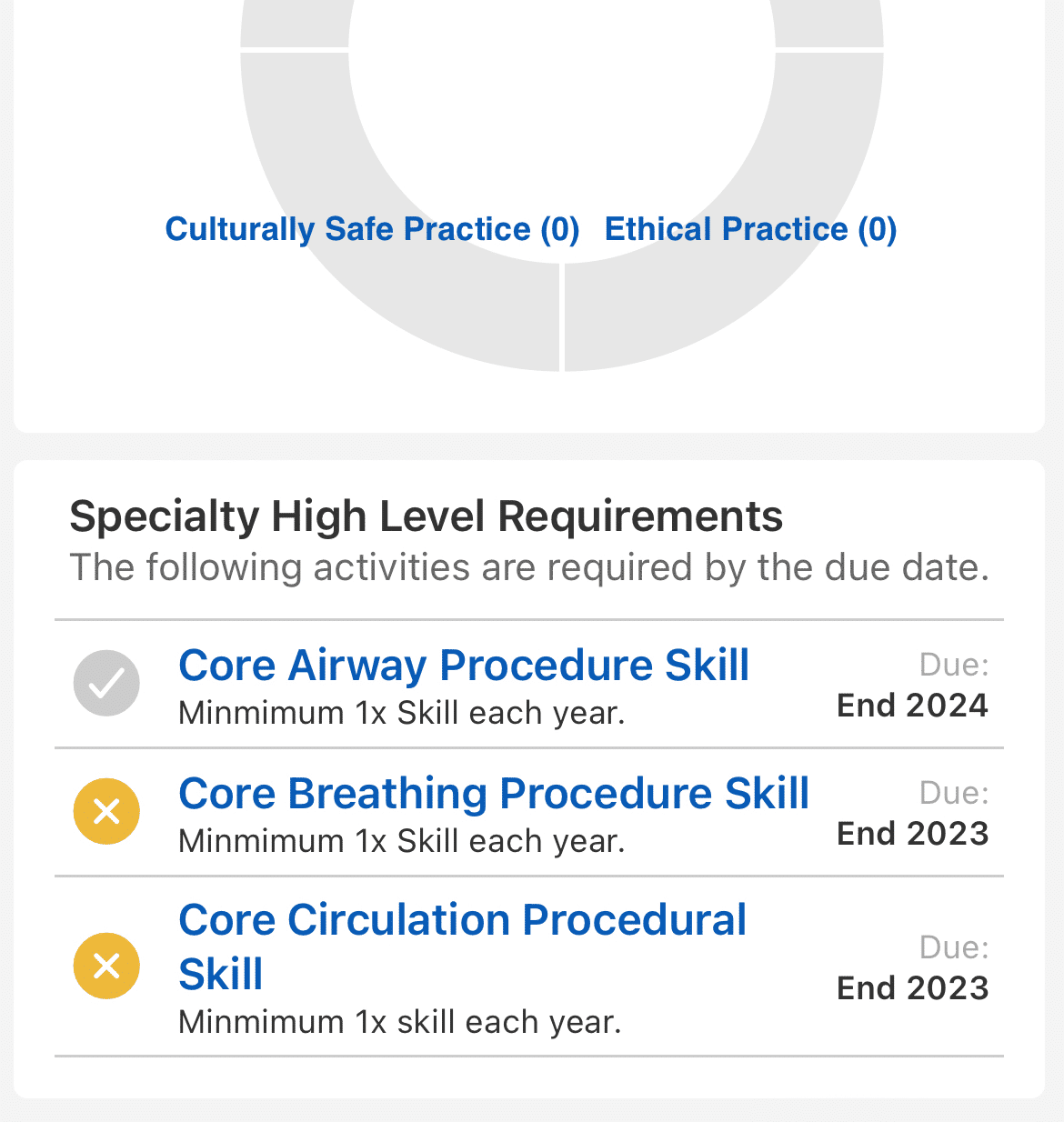Osler CPD Home
$275 for 2025!
Osler’s CPD Home - how it works
Basic Requirements
All CPD Homes have the same basic requirements. Each year, you will need :
A documented Personal Career Development Plan (PCDP) for the current 12 month period
To complete at least 50 hours of CPD activities, comprised of :
a minimum of 12.5 hours of Learning Activities
a minimum of 5 hours of Reviewing Performance
a minimum of 5 hours of Measuring Outcomes
a combined total of 25 hours for Monitoring Performance and Measuring Outcomes
the remaining time can be taken from any of the three categories
For each activity, you must provide sufficient evidence of the activity, and keep your records for 3 years.
Personal Career Development Plan
It’s difficult to navigate your path without a map - that‘s what your PCDP should be for your learning.
Creating one takes a bit of time and effort, but it can set up your learning for the year.
Follow the steps below to create your first plan
Reflect - what are you good at? What are you struggling with? Review your logbook, reflections, diary and feedback, ask your peers and colleagues, and think about your strengths and weaknesses. Consider where you would like your career to go
Create a plan - having identified your objectives, it is now time to outline some goals. Osler recommends each goal follow the SMART approach - specific, measurable, achievable, relevant, time-based
Get feedback - Osler highly recommends you share your plan with a trusted person or supervisor. You can create a link to share your plan with anyone you wish, and they will be able to securely add their feedback on how to make your plan better.
Complete tasks - return to your PCDP regularly and use it to stay on track. You can tick tasks off as you achieve them
Reflect - at the end of each year, take the time to reflect on your progress
Not only does creating a plan tick off a mandatory box, but you can also claim it as time for Monitoring Performance category of CPD activities. Osler calculates this automatically for you when you create your plan, and enters it into your CPD diary (you’re off to a great start already!)
You’ll even get a bonus 15 minutes added if you ask for, and receive, feedback on your plan.
Completing Relevant Activities
At Osler, we believe you are the best judge of the activities which will drive your practice further. We recommend that you choose activities that are relevant to your current or future scope of practice.
-
Examples of activities include :
Individual focussed activities
Creating scratchnotes on Osler
Reading, viewing or listening to educational material
Active learning modules
Study towards higher formal qualifications
Supervised practice
Group focussed activities
Lectures, forums and panel discussions
Small group sessions
Courses and workshops
Not directly focussed on participant's practice
Teaching, lecturing, examining, assessing and evaluating
Supervising and mentoring
Participating in forums, panels, educational meetings
Leading / participating in research / publishing / presentation of results
Editing or reviewing research or educational material
Preparing patient education materials
Participating in committees for education / research
Undertaking college/ society education roles
Participating in clinical guideline development
-
Examples include :
Individual focussed
Self evaluation and reflection
Direct observation of practice by a colleague / Peer review
Multi-source feedback
Patient experience survey
Workplace based appraisal
Group focussed
Direct obseration of practice in team settings
Multisource feedback
Patient experience survey
Medical service survey / review
Multidisciplinary team meetings
Peer Review group meetings
Not specifically focussing on participant's practice
Participating in clinical governance or QA committees
Accreditation / auditing of practices, hospitals, training sites
Medicolegal work (eg reports, expert witness)
Note : Each self reflection you record in your portfolio will count towards your time in this category - the more reflections you perform, the more time you will accrue. The value of each self reflection will increase if you ask for and receive feedback on the reflection
Additionally, completing your Personal Career Development Plan will entitle you to claim up to 3 hours in this category.
-
Examples include :
Individual focussed
Logbooks
Audit, focussed on own practice
Root cause analysis
Incident reports and management
Individual Quality improvement projects
Group focussed
Audit of practice (unit, national, international)
Morbidity and mortality meetings, case conferences and reviews
Quality Improvement Projects
Multidisciplinary team meetings
Not specifically focussed on practice
Assessing incident reports
Leading, analysing and writing reports on healthcare outcomes
Note : Each case and procedure you record in your logbook will count towards your time in this category. The more procedures and cases you record, the more time you will accrue.
The value of each case or procedure increases if you ask for and receive feedback.
Program Level Requirements
Within your learning, you also need to demonstrate your learning addresses the Medical Board’s Code of Conduct.
This targets 4 core areas:
Ethical practice
Professionalism
Cultural sensitivity
Addressing health inequality
Your learning must include at least one activity (4 in total) solely or substantially dedicated to each of these core areas.
How to capture Program Level Requirements
Some activities have already been pre-approved on Osler. When you complete them, you’ll notice one of the boxes automatically appears ticked. Look out for recommended activities in the system, and in our communications to you.
You can also include activities you perform outside the Osler platform - simply tag the entry with one of these categories.
Compliance
To be compliant, you’ll need to undertake at least one activity in EACH of these categories.
To meet this criterion, consider whether your activity is sufficiently aligned with Good medical practice: a code of conduct for doctors in Australia, published by the Medical Board of Australia. It should be :
solely or substantially dedicated to the category (ethical practice, professionalism, addressing health inequities and culturally safe practice)
It should be of sufficient depth and quality to meet the learning objectives
It should be provided by a credible and respected organisation or individual with expertise in the topic.
If you’re having difficulty finding something for each of these categories, you can select an activity from a range of Osler content, which can be found in related content collections under each of the above topics.
Specialist High Level Requirements
If you are a specialist in Australia, you may be required to perform additional tasks set by the relevant college.
These include :
Emergency medicine
General Practice
Anaesthetics and Pain Medicine
Medical Imaging
Sports and Exercise Medicine
Psychiatry
Surgery
When you log a CPD activity, you'll be able to select which Specialty High Level Requirement (if any) the activity relates to.
Any tasks you need to complete in this cycle will be highlighted in yellow on your CPD Home page. Once you've completed the activity your portfolio page will update and the tasks will be green.
The requirements set by the colleges for Specialty High Level Requirements are as follows:
-
A specialist anaesthetist must:
complete at least one emergency response activity per year
complete at least one of the following activities per year to directly evaluate and reflect on their own clinical practice:
structured patient survey
multi-source feedback
peer review
clinical audit
-
A specialist pain medicine physician must:
complete at least one emergency response activity per year
complete AT LEAST ONE of the following activities per year to directly evaluate and reflect on their own clinical practice:
structured patient survey
multi-source feedback
peer review
clinical audit
-
A specialist emergency medicine physician (including all fields of specialty practice) must:
complete three core procedural skills per year:1x core airway procedural skill1x core breathing procedural skill1x core circulation procedural skill
-
A specialist general practitioner must:
complete a CPR (cardiopulmonary resuscitation) course every three years
-
A specialist psychiatrist must:
complete a minimum of 10 hours of formal peer review per year
-
A specialist surgeon (including all fields of specialty practice) must:
participate in the Australia and New Zealand Audit of Surgical Mortality (ANZASM) by completing all surgical case forms sent to the surgeon by ANZASM
-
A specialist radiologist must:
complete anaphylaxis training as part of basic or advanced life support training once every three years
-
A specialist sport and exercise physician must:
complete WADA/Sport Integrity Australia anti-doping education every three years and
complete ANY ONE of the following courses in every three-year period:
management of Sports Trauma course (MOST)
basic cardiac life support course (BCLS)
advanced cardiac life support course (ACLS)
AFL Emergency Care Course
immediate care in rugby course (level 2 or 3 course)
Compliance with and monitoring of your CPD
Your CPD Home portfolio page follows your progress in real time.
Completed tasks are shown in blue, while tasks you still need to complete are shown in grey. Important pending tasks are shown in yellow.
When you have completed all your tasks, you will be compliant with the CPD requirements for re-registration with the Medical Board of Australia (read the standard here).
Osler will notify the MBA of your completion between March and June following each year, ahead of your registration.
You will be able to download and print a certificate for your own needs if you wish.
Each year, Osler is required to audit 5% of members to ensure sufficient documentation has been provided.
Examples of the documentation required to pass audit are shown in this document





